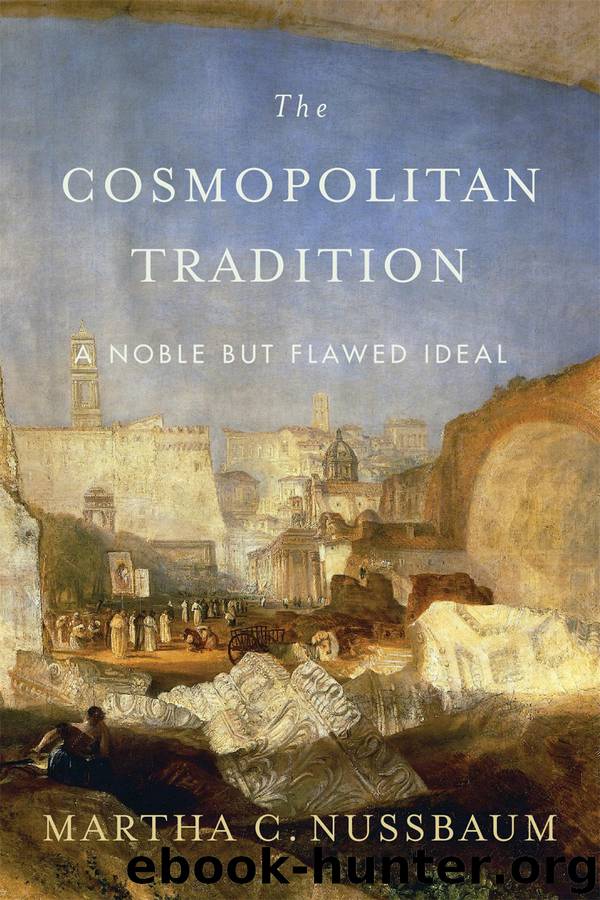The Cosmopolitan Tradition: A Noble but Flawed Ideal by Martha C. Nussbaum

Author:Martha C. Nussbaum
Language: eng
Format: epub
Tags: Philosophy, Political
Publisher: Harvard University Press
Published: 2019-08-13T00:00:00+00:00
The idea that all human beings are profoundly equal with respect to basic capacities that are the seat of human dignity, and that distinctions of class and rank are artificial, is a familiar Stoic idea. But Smith gives them a new twist, in two significant ways. First, he emphasizes the importance of work and the influence of occupation on one’s human abilities, something that did not particularly interest the Stoics. Second, he shows that different conditions of life do not merely create different classes and ranks of people in the eyes of those who are foolish enough to care about such things; they actually form the person, directly affecting the development of human abilities. To this crucial claim we shall return in section III.
Thus WN sets itself squarely in the Stoic tradition: human dignity consists of a set of capacities for rational and reciprocal relations. What Smith adds to that tradition is, however, profound: for he sees in the relationships of contract and exchange—which ancient Greeks, being leisured gentlemen, typically devalued—an expression of core dignity values. Material relations are not low, as the Greeks typically thought (and thus they assigned them to slaves and women, rather than freeborn gentlemen). Instead, they are, or at least can be, forms of mutually respecting rationality.
This being the case, Smith also holds throughout WN that the perversion of these relations is no small matter, but a deformation of the entire humanity of a person. There are, of course, many forms of exchange, just as there are many types of property. But the property of each man in his own labor12 is, for Smith, the “original foundation of all other property” (138), the core form of property from which all other forms derive; this claim is closely linked to the claim that labor is “the real measure of the exchangeable value of all commodities” (47). Because this is so, each man’s property in his labor is “the most sacred and inviolable” form of property. It is that in us that permits us to express ourselves toward others on terms of mutual respect and reciprocity, bargaining like dignified human beings rather than fawning like dogs. Therefore, the fact that workmen under actual conditions are in many ways prevented from using their labor power in the way they want is not only a paradigmatic violation of property rights, it is also an insult to their humanity, thus a violation of basic justice:
The property which every man has in his own labour, as it is the original foundation of all other property, so it is the most sacred and inviolable. The patrimony of a poor man lies in the strength and dexterity of his hands; and to hinder him from employing this strength and dexterity in what manner he thinks proper without injury to his neighbour, is a plain violation of this most sacred property. It is a manifest encroachment upon the just liberty both of the workman, and of those who might be disposed to employ him.
Download
This site does not store any files on its server. We only index and link to content provided by other sites. Please contact the content providers to delete copyright contents if any and email us, we'll remove relevant links or contents immediately.
The Body: A Guide for Occupants by Bill Bryson(5097)
The Longevity Diet by Valter Longo(5064)
Ikigai by Héctor García & Francesc Miralles(4274)
Limitless by Jim Kwik(3175)
The Checklist Manifesto by Atul Gawande(2854)
The Body by Bill Bryson(2626)
Memory Rescue by Daniel G. Amen(2425)
What Color Is Your Parachute? 2015 by Richard N. Bolles(2311)
Breath by James Nestor;(2309)
Becoming Myself by Irvin D. Yalom(2250)
Fat for Fuel by Joseph Mercola(2010)
Memory Rescue: Supercharge Your Brain, Reverse Memory Loss, and Remember What Matters Most by Amen Dr. Daniel G(1980)
Awakening Your Ikigai by Ken Mogi(1816)
The Daughter's Return by The Daughter's Return(1799)
Weight Training by Thomas Baechle(1774)
50 After 50 by Maria Leonard Olsen(1720)
Starting Over (Sugar Creek Romance ) by Jordan Silver(1689)
Dirt by Bill Buford(1682)
1610396766 (N) by Jo Ann Jenkins(1681)
